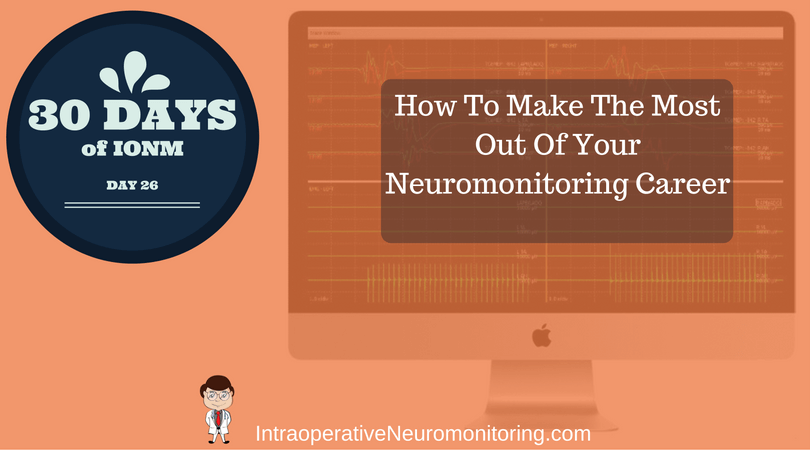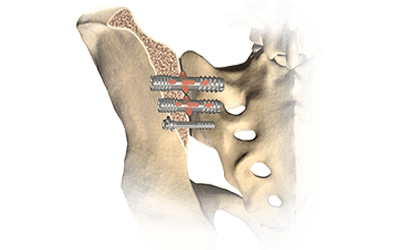The Road To A Successful Surgical Neurophysiologist Career
Whenever I speak to people looking to get into neuromonitoring, I try to give them advice that will help them make a decision beyond starting their surgical neurophysiologist career. This is a career, not a job, so they might run into problems if they don’t consider the long run. If you get into the field by either earning an intraoperative neuromonitoring degree or going through a neuromonitoring training program with a company, you’re going to have to make an investment in order to start your surgical neurophysiologist career. Whether it is time, money, effort or all 3, you’re going to have to pay to play.
But what about the people that have made that decision and have found employment? What advice would I give those just starting their surgical neurophysiologist career – the same I wish I could give myself 9 years ago?
I’m going to include some advice that is relevant to building a successful surgical neurophysiologist career, but not necessarily specific to our industry. The purpose of the website is to help out those in the IONM field, even if that means going off topic a little. But if it gets you to take action, this article will be way more valuable to you than the other more clinically oriented article (like how to monitor a selective dorsal rhizotomy case, which you should read if you missed that one).
And since a large percentage of the readers of this website are young professionals, I am going to skew it a little that way.

Age ranges of the readers of intraoperativeneuromonitoring.com
Tips For A Fruitful Surgical Neurophysiologist Career
- Sprint first, jog later – When you first start in the field, the amount of information thrown at you can be a little overwhelming. The only way to really handle it, in my opinion, is to dive right into the deep end and don’t come up for air till you’ve got it. If you’re willing to really commit yourself for the next 6 months, the payoff will be for the rest of your career (look at it as your residency). Tell your family and friends ahead of time that you’re starting a new, meaningful endeavor, and it might monopolize your time for a short while. If you put in the work and earn your stripes early on, you’re more likely to be given responsibility that puts you in the driver seat of a very successful career. At that point, you should treat your career as a never-ending process of growth and learning… but do not flirt with the consequences of burnout. You’re making this a career that can span decades and you’ll only get to the finish line with an appropriate pace.
- Take advantage of the benefits – Most people grab their benefits package, look over their medical coverage, curse Obama’s name and check out their PTO accrual. But some companies offer a ton more. Look to see what kind of educational support package you have in there. Some will have a nice chunk of change to send you to conferences, money towards books or research articles and will even pay college courses. Yes, that is all happening in the neuromonitoring field. It’s a great way to help round out any weakness you have (afraid of doing craniotomies – sign up for a neuroanatomy course) or move your career the path you wish to take it. I’ve taken MBA courses from here all on the company dime. If you don’t have those types of benefits, then you’re going to have to do your best to find free resources if you’re looking to learn more neuroanatomy, for instance.
- Improve your financial IQ early in your career – The first two suggestions will help you with your neuromonitoring salaries. This one is about how to get more out of it over your surgical neurophysiologist career (a slow and steady process, nothing sexy about it). As stated above, make use of your benefits. This may include a 401K/403b program, and there might be a company match to boot (ALWAYS go get that free money. Seriously, if you aren’t getting all of your company match, you really need to change that today). I started to get into personal finance just after passing the CNIM (entering the “jog” phase of my studies). Even though I think I have a plan that works, I’m in no real position to give anyone financial advice. Remember, at one point in my life, I thought it was a good idea to take on $135,000 in debt for a chiropractic degree. But the sooner you improve your IQ about your personal finances – and actually take action – the more likely you’re going to be able to enjoy the fruits of your labor. In order to keep myself from the temptation of going on an investing rant, I’m going to give links to sources that can allow for a comfortable retirement… with the opportunity for early retirement should that be something of interest to you.
- No better place to start than the advice that will have the largest impact – the fundamentals of investing. If you have never heard of the bogelheads community before, then I might have become your new best friend. The earlier you start, the better. (Their forum is one of the best resources on the internet. Really, really good.)
- Financial blog with a medical twist. Smart guy. I share his opinion on most things, like living like a resident early in your surgical neurophysiologist career, invest in low fee index funds or ETFs, use every tax shelter you can, insurance makes a poor investment vehicle (whole life), keep a small part of your investment in higher risk/reward (I do unsecured loans at prosper.com/). Very relevant to a lot of us with student loan debt.
- Great place to get saving, investing and planning from an accountant. Boring topics, but can save or earn you a lot of money. And that’s fun.
- Start from what you need in retirement (“I need to live off of $50,000 per year”) and then work backward to find your number ($50,000/yr means you should have investible assets around $1,250,000 to $1,450,000). This website is all about retirement planning and this calculator will give you the probability of you running out of money if you tried retiring with a certain amount of assets. This is another one to check out.
- There are only a couple of levers under your control for building wealth. Controlling what you spend is a major one. This blog teaches you how to be a smarter consumer or even why it is so smart to be frugal. Really make smart moves on your larger purchases, like “Buying a house or renting?”
- If you have some money, but don’t know if you should invest or pay down debt, here’s how to form a strategy that makes financial sense.
- Increase versatility now in order to accommodate the future version of you – there is a pretty good percentage of people in the field of neuromonitoring that will start to have a change in interest and priorities over time. Some might want to really get into the research and help move the profession to the next step. Others might want to get into IONM management or business development of some sort. While some might have had those goals all along, others have no idea that they would want to pursue that path. My dad drove around in the hot Florida sun in a suit going to sales meetings. I knew in high school that I would never get into anything like that. Wearing pajamas (scrubs) to work every day was a perk that had my full attention. But now I find myself leaning towards interest where a suit it part of the uniform for at least part of the time. As I started to think about it as a possibility, I did some self-study first and some college courses next to make sure I would be prepared should something come my way. A lot of opportunities are dependent on timing. Take timing out of the equation as much as you can by being prepared.
- Improve your circle of influence – you should make a conscious effort to continue to build your network within the monitoring field, but also maintain the ones you already have. Whenever I start talking shop with someone that works for a different company or hospital, it amazes me how different opinions and practices can be. Sometimes I think they are way off, sometimes I see their point and other occasionally I admit to being wrong and change the way I do things. You’ll never be able to leech off of other people’s experience if you stay to yourself. Not a great move, in my opinion, especially if you’re starting out your surgical neurophysiologist career.
- Find a flexible outlet – having a schedule that is ever changing doesn’t allow for a lot of hobbies. But you should really find something that has the flexibility to work with your work schedule. I’m talking about the preservation of your sanity here. I’ve had to come to terms that I’m probably not going to be my son’s soccer coach for his team (assuming he wants to play soccer), but I’ll still be able to coach him on my downtime. And the amount of time that we find ourselves parked in a chair, you might want to chose a hobby that keeps you active (unlike starting a blog).
- Appreciate the (lack of) size of our community – even though the field is estimated to continue to grow close to 10% over the next couple of years, the trend of consolidation continues. I have found myself in this situation as of last month when SpecialtyCare bought out Sentient Medical. With the merger of the 2 companies, the state of Florida (where I live) is dominated by SpecialtyCare. Trust me, I’m excited about the merger… but what if I wasn’t? What if they weren’t excited about me? My world could be very different today than it was last week. A lot of what I write about is positioning you to stick out as a leader in a small profession, but it is just as easy to stick out as a problem. Maybe easier. In such a small space, with worlds continuing to collide, you need to make sure that you stay on the up-and-up.
What about you? Do you have any words of wisdom to help others with their surgical neurophysiologist career? What about for remote physicians?

Joe Hartman
Subscribe to our Awesome Newsletter.
1 Comment
Keep Learning
Here are some related guides and posts that you might enjoy next.
How To Have Deep Dive Neuromonitoring Conversations That Pays Off…
How To Have A Neuromonitoring Discussion One of the reasons for starting this website was to make sure I was part of the neuromonitoring conversation. It was a decision I made early in my career... and I'm glad I did. Hearing the different perspectives and experiences...
Intraoperative EMG: Referential or Bipolar?
Recording Electrodes For EMG in the Operating Room: Referential or Bipolar? If your IONM manager walked into the OR in the middle of your case, took a look at your intraoperative EMG traces and started questioning your setup, could you defend yourself? I try to do...
BAER During MVD Surgery: A New Protocol?
BAER (Brainstem Auditory Evoked Potentials) During Microvascular Decompression Surgery You might remember when I was complaining about using ABR in the operating room and how to adjust the click polarity to help obtain a more reliable BAER. But my first gripe, having...
Bye-Bye Neuromonitoring Forum
Goodbye To The Neuromonitoring Forum One area of the website that I thought had the most potential to be an asset for the IONM community was the neuromonitoring forum. But it has been several months now and it is still a complete ghost town. I'm honestly not too...
EMG Nerve Monitoring During Minimally Invasive Fusion of the Sacroiliac Joint
Minimally Invasive Fusion of the Sacroiliac Joint Using EMG Nerve Monitoring EMG nerve monitoring in lumbar surgery makes up a large percentage of cases monitored every year. Using EMG nerve monitoring during SI joint fusions seems to be less utilized, even though the...
Physical Exam Scope Of Practice For The Surgical Neurophysiologist
SNP's Performing A Physical Exam: Who Should Do It And Who Shouldn't... Before any case is monitored, all pertinent patient history, signs, symptoms, physical exam findings and diagnostics should be gathered, documented and relayed to any oversight physician that may...








I am learning so much from your website, thank you